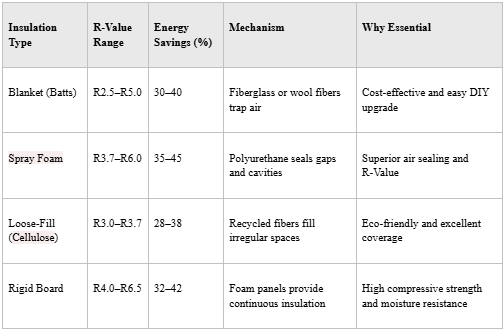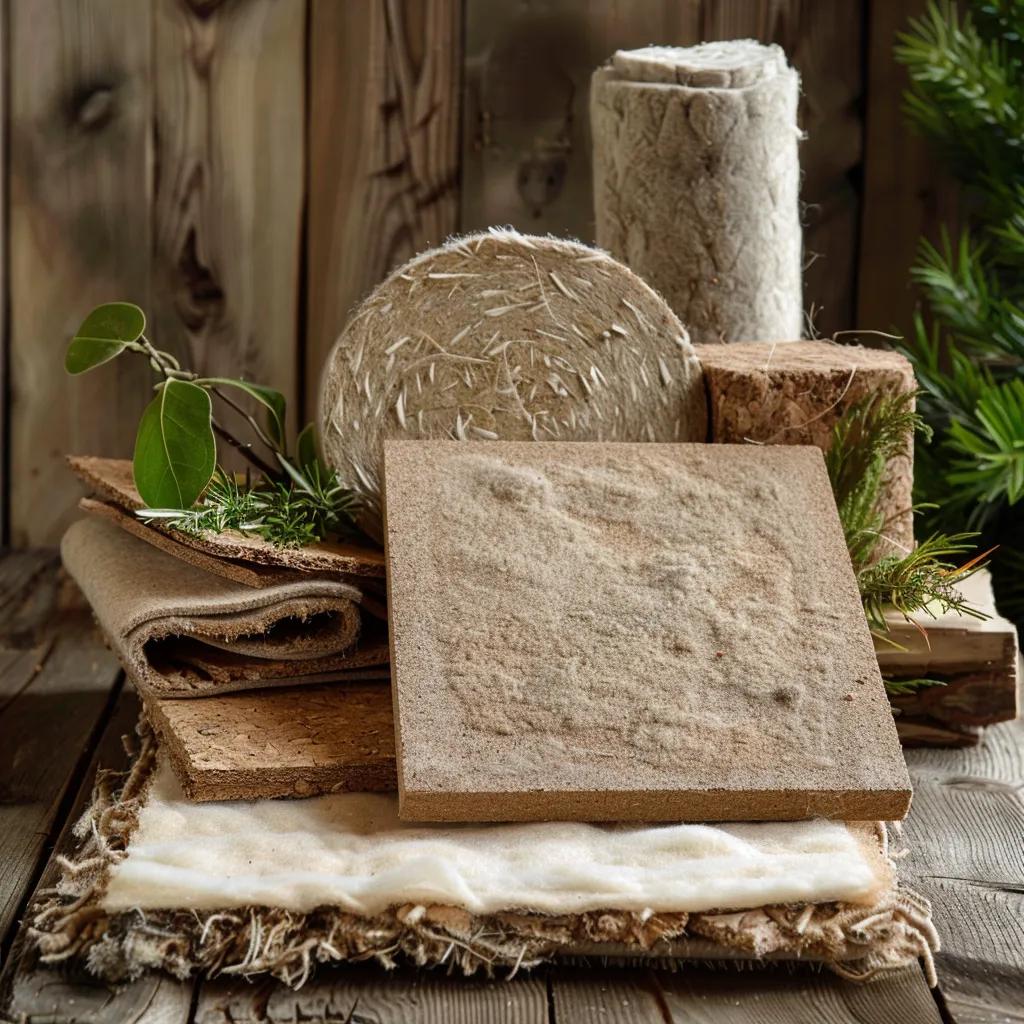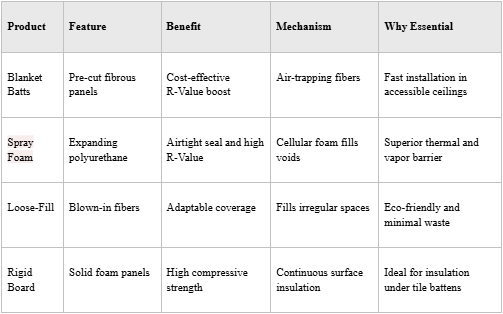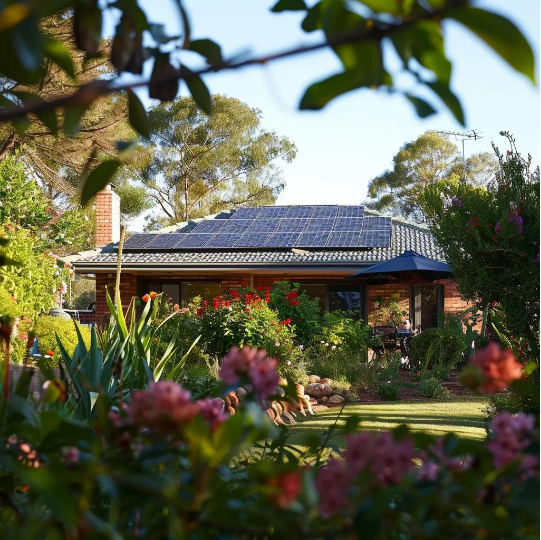Roof insulation reduces energy bills in Adelaide by creating a continuous thermal barrier that blocks unwanted heat flow, improving comfort and lowering utility costs.
By trapping conditioned air inside and reflecting external temperatures, proper roof insulation enhances energy efficiency, stabilises indoor climates, and curbs carbon emissions.
This article maps out how roof insulation delivers cost savings, thermal comfort, soundproofing, environmental advantages, moisture control, and increased property value while spotlighting the insulation types best suited to Adelaide’s climate and the local building code and rebate considerations that maximise your return on investment.
How Does Roof Insulation Improve Energy Efficiency and Reduce Adelaide Energy Bills?

Roof insulation creates a thermal resistance layer (R-Value) that slows heat transfer through ceilings, reducing the workload on heating and cooling systems and cutting energy consumption by up to 30–40 percent in Adelaide homes. This mechanism directly translates into lower electricity and gas bills and extends equipment lifespan through reduced runtime.
What Is R-Value and How Does It Affect Thermal Resistance?
R-Value measures an insulation material’s ability to resist conductive heat flow, higher R-Values mean greater thermal resistance. In Adelaide’s mixed climate, an R-Value between R3.0 and R5.0 for ceiling insulation optimally balances summer heat rejection and winter heat retention, directly impacting how much conditioned air remains inside.
Energy Efficiency and R-Value
Roof insulation's effectiveness is often quantified by its R-value, which measures its resistance to heat flow. Higher R-values generally indicate better insulation performance, which is important for managing temperature fluctuations in homes and reducing energy consumption.
How Roof Insulation Reduces Heat Transfer in Adelaide’s Climate
In summer, roof insulation reflects and dissipates solar heat before it breaches the ceiling cavity, while in winter it traps interior warmth against external chill. This dual action relies on reflective foil facings combined with bulk insulators (glass wool or cellulose) to create an integrated barrier that mitigates Adelaide’s seasonal temperature swings.
How Much Can You Save on Heating and Cooling Costs with Roof Insulation?
A typical Adelaide household can save between 25% and 40% on annual heating and cooling expenses after professional roof insulation installation.
- Annual electricity savings: AU$300–AU$600
- Annual gas savings: AU$150–AU$350
- Payback period: 3–5 years
These figures assume a mid-range R-Value upgrade and average local energy rates.
Which Insulation Types Offer the Best Energy Savings?
Below is a comparative breakdown of common roof insulation types ranked by energy-saving potential in Adelaide’s climate.

How Does Roof Insulation Enhance Thermal Comfort in Adelaide Homes?
Roof insulation maintains stable indoor temperatures by reducing thermal fluctuations, fostering consistent comfort throughout both hot summers and cooler winters. It creates a buffer zone that keeps conditioned air inside, ensuring rooms feel evenly warm or cool without temperature spikes.
How Does Insulation Maintain Stable Indoor Temperatures Year-Round?
Insulation acts as a thermal sponge, absorbing and releasing heat slowly to prevent rapid temperature swings. During peak heat, it limits solar gain; during cold snaps, it holds interior warmth resulting in a more balanced and predictable indoor climate.
What Are the Benefits of Roof Insulation for Summer Cooling and Winter Warmth?
Roof insulation enhances summer and winter comfort in three main ways:
- Summer Cooling: Reflects radiant heat and reduces attic temperatures by up to 15 °C, lowering air-conditioning loads.
- Winter Warmth: Retains indoor heat and prevents cold drafts from infiltrating, reducing furnace runtimes.
- Year-Round Stability: Minimises hot and cold spots, creating uniform comfort and improving sleep and productivity.
These benefits directly enhance living quality and reduce reliance on HVAC systems.
How Does Adelaide’s Climate Influence Thermal Comfort Solutions?
Adelaide’s Mediterranean climate demands insulation that performs under both intense summer sun and cooler winter nights. Combining reflective foils with bulk insulation (glass wool or polyester batts) adapts to this dual challenge, ensuring optimal thermal comfort regardless of seasonal extremes.
Can Roof Insulation Help with Soundproofing Your Home in Adelaide?
Yes, roof insulation significantly reduces external noise by inserting dense fibrous or foam materials that dampen airborne and impact sound, resulting in quieter indoor environments.
How Does Roof Insulation Reduce External Noise?
Insulating materials absorb sound waves and disrupt their transmission through roof cavities. Fiberglass batts and cellulose loose-fill convert noise energy into minute heat fluctuations, effectively muffling traffic, rain, and neighborhood sounds before they reach living spaces.
Which Insulation Materials Provide the Best Acoustic Performance?
Three top acoustic insulators for roofs:
- Mineral Wool Batts: High density and fibrous structure block mid to high frequencies.
- Cellulose Loose-Fill: Dense, interlocking fibers absorb a broad sound spectrum.
- Spray Foam: Creates an airtight seal that reduces reverberation and impact noise.
Selecting acoustic-grade insulation can lower noise levels by up to 50 percent, enhancing home tranquility.
What Are Real-Life Examples of Noise Reduction with Roof Insulation?
Homeowners in inner-suburban Adelaide reported a 40 percent decrease in traffic noise after retrofitting roofs with mineral wool batts. In another case study, loose-fill cellulose installation reduced rainfall impact noise by 30 percent, demonstrating tangible acoustic comfort improvements.
What Are the Environmental Benefits of Sustainable Roof Insulation in Adelaide?
Sustainable roof insulation lowers greenhouse gas emissions by reducing energy demand and utilising eco-friendly materials that minimise environmental impact across their lifecycle.
How Does Roof Insulation Contribute to Lower Carbon Emissions?
By curbing energy consumption, roof insulation cuts household carbon footprints by up to 1–2 tonnes CO₂ annually. Less fuel and electricity usage directly translates to fewer emissions from power plants and gas heaters, supporting Adelaide’s broader climate goals.
What Sustainable Insulation Materials Are Available Locally?

Adelaide homeowners can choose from:
- Cellulose (Recycled Paper): Made from up to 85% recycled fibers.
- Sheep’s Wool Batts: Biodegradable and renewable natural fiber.
- Cork Boards: Harvested from sustainable cork oak plantations.
How Do Government Rebates Support Sustainable Insulation Choices in Adelaide?
Local and federal rebate programs offer up to AU$1,500 off sustainable insulation installations under energy efficiency schemes. Homeowners can claim incentives that cover labor and materials for approved eco-friendly products, reducing upfront costs and accelerating payback.
How Does Roof Insulation Improve Moisture Control and Indoor Air Quality?
Roof insulation minimises condensation and mold growth by maintaining roof cavity temperatures above dew point and sealing gaps where moisture intrudes, reducing allergens and supporting healthier indoor environments.
How Does Insulation Prevent Condensation and Mildew?
A continuous insulation layer prevents warm indoor air from meeting cooler roof surfaces, eliminating moisture buildup. Closed-cell spray foam and foil-faced batts also act as vapor barriers, stopping water ingress and fungal growth.
What Are the Health Benefits of Improved Indoor Air Quality?
By reducing mold spores and damp-related pollutants, roof insulation supports respiratory health, lowers allergy triggers, and improves overall well-being. Cleaner air reduces doctor visits and enhances sleep quality and daily comfort.
How Does Proper Installation Affect Moisture Management?
Professional installation ensures correct vapor barrier placement and seamless coverage, preventing thermal bridging and moisture traps. Certified roofers assess roof ventilation and roofing membranes to integrate insulation without compromising moisture control.
How Does Roof Insulation Increase Property Value in Adelaide?
Roof insulation adds tangible value by delivering lower operating costs, enhanced comfort, and documented energy ratings that appeal to buyers and tenants, boosting marketability and sale price by up to 5 percent.
What Evidence Shows Insulation Adds Value to Residential and Commercial Properties?
Real estate analyses indicate that homes with ceiling insulation sell 10–12 percent faster and command premiums of AU$10,000–AU$25,000, reflecting buyer demand for energy-efficient, comfortable properties.
Property Value and Energy Efficiency
Studies have shown that energy-efficient homes, including those with roof insulation, often command higher market values. This is due to the long-term cost savings and increased comfort that energy-efficient features provide to homeowners.
How Do Energy Efficiency and Comfort Improvements Influence Market Appeal?
Energy-rated homes attract environmentally conscious buyers and yield higher rental yields. Improved thermal performance and acoustic comfort position properties as modern, sustainable investments that meet evolving building standards.
Why Choose Adelaide Roofing and Construction for Insulation Installation?
Adelaide Roofing and Construction combines local climate expertise, certified installers, and compliance with South Australian building codes to deliver seamless, high-performance roof insulation. Our dedicated project management and post-installation support ensure maximum energy savings and lasting comfort for every homeowner.
What Are the Different Types of Roof Insulation and Their Specific Benefits?
Selecting the right insulation type involves balancing thermal resistance, installation complexity, and moisture control. Each option offers distinct advantages for Adelaide homes.
How Do Blanket, Spray Foam, Loose-Fill, and Rigid Board Insulation Compare?

Which Insulation Type Is Best Suited for Adelaide Homes?
For traditional tile or metal roofs, foil-faced blanket batts paired with loose-fill cellulose offer the best balance of cost, R-Value, and moisture control. Spray foam excels in air sealing complex rooflines, while rigid boards suit lightweight metal deck installations.
How Does Each Insulation Type Affect Energy Efficiency and Comfort?
- Blanket Batts: Moderate R-Value and reflective foil create cooler attics and warmer rooms.
- Spray Foam: Highest thermal resistance and air barrier deliver peak efficiency.
- Loose-Fill: Seamless coverage ensures uniform comfort.
- Rigid Board: Continuous panels eliminate thermal bridging for stable indoor climates.
What Local Considerations Should Adelaide Homeowners Know About Roof Insulation?
Adelaide’s building codes, climate patterns, and rebate schemes shape the insulation selection and installation process, ensuring compliance and optimum performance.
How Do Adelaide’s Building Codes Impact Roof Insulation Requirements?
South Australian regulations mandate minimum R-Values for ceiling insulation (R4.1 for new builds). Professional installers must document compliance and provide energy assessment certificates upon completion.
What Are the Climate Challenges Unique to Adelaide That Affect Insulation?
Adelaide’s hot, dry summers and cool, damp winters require insulation that both reflects solar radiation and retains heat reliably. Proper ventilation and moisture barriers are key to avoid condensation in transitional seasons.
How Can Homeowners Access Government Rebates and Incentives?
Eligible homeowners can apply for state and federal rebates by submitting proof of purchase and installation certificates to the South Australian Department for Energy and Mining. Accredited installers streamline this process by handling rebate paperwork on your behalf.
Investing in professional roof insulation installation delivers measurable energy savings, superior comfort, and environmental benefits. All while boosting property value and ensuring compliance with Adelaide’s building standards. Engaging certified experts guarantees a seamless process from material selection to post-installation performance, making roof insulation one of the smartest home improvements for long-term return on investment.

